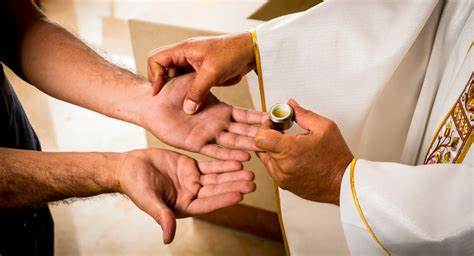
Holy Communion & Anointing of the Sick
The parish wish to offer every possible support to you or your loved one who is ill. The Sacraments of Holy Communion, Confession and Anointing of the Sick are a wonderful source of grace and healing and Fr. Paul is happy to visit your loved one who is sick. The Sacrament of Anointing is not only for those who are seriously ill but can be received by the infirm, those in advanced years, or anyone prior to surgery.
Eucharist to the Housebound/First Friday Communion Calls
Visits to the housebound with Holy Communion are carried out by parish clergy, our Parish Sister and also with the support of Extraordinary Ministers of the Eucharist. If you, or you know of someone who is unable to attend Mass due to illness or frailty and would like to receive the sacraments in your/their home, please contact the Parish Office, Please ensure you have the permission of the parishioner.
Arrangements Required for Holy Communion House Visit
You don’t really need to do anything before the priest comes. But if you have a clean table that you can place a candle and the cross then that will help the priest especially if you have asked for Holy Communion. Any candle will do, it doesn’t have to be a blessed one. If you have a white cloth you can put it on the table, but don’t worry about such things, if they are easily to hand fine, if not don’t worry.
Anointing of the Sick
The sacrament of anointing calls upon God’s healing and loving presence, it brings comfort, peace and courage.The Sacrament can be celebrated in the church, or in your home.
If you wish to receive the Anointing, please contact Fr. Paul through the parish office
Please ensure you have the permission of the parishioner. Also inform the Parish Office if the call is urgent i.e. there is danger of death or you have a date fixed for major surgery etc.
What Is the Sacrament of the sick?
The Sacrament of the Anointing of the Sick is a prayerful celebration for someone or for a group of people who are ill and are blessed by the priest with Holy Oil. The sacrament helps us put our trust in the loving God. It can bring comfort, peace and courage at a very stressful time.
Symbolism
The words of blessing over the oil is “oil intended to ease the sufferings of your people”. Oil soothes and heals. It gives comfort, peace, courage and, if the sick person is unable to make a confession, even forgiveness of sins
Oil
The oil that is used is Olive Oil. The Bishop blesses it at the ‘Chrism Mass’ on Holy Thursday in the Pro Cathedral, Dublin. The holy oils are then taken each year to each parish and hospital for use throughout the year in the Sacrament of the Sick.
How?
A person is anointed on the forehead and the palms of the hands while the priest says:
“Through this holy anointing may the Lord in his love and mercy help you by the grace of the Holy Spirit. May the Lord who heals you, save you and raise you up.”
Who Can Be Anointed?
Anyone in ‘serious illness’, those who are infirm, in advanced years, or anyone prior to surgery. (It is not only for when a person is in ‘danger of death’)